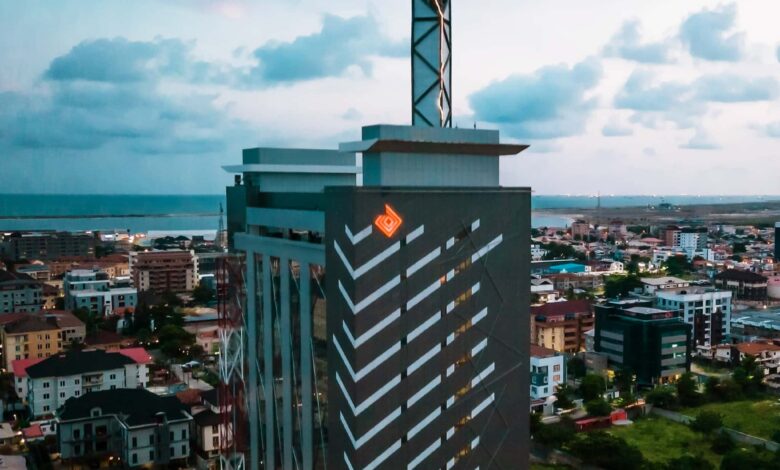Access Holdings:An Under-performing Giant.

In the game of business, size is just a number – it’s what you do with it that counts. Bigness without stretch and leverage is like being a sumo wrestler, all bulk and no agility. You’re a giant, but you’re also a sitting duck. On the flip side, smallness without stretch and leverage is like being a lightweight boxer, all punch and no power. You’re quick, but you’re not going far.
The real winners are those who know how to work their magic, leveraging their strengths to create unstoppable momentum. They’re the ones who turn their bigness into a battering ram or their smallness into a stealthy ninja move; it’s not about being big or small – without the stretch, and leverage that provide the energy and rationale for proactive advantage building and industry re-engineering , resource accumulation may not deliver the industry leadership where it matters .
With its status as the largest bank in Nigeria by assets, but with the lowest profit and market value, Access Holdings’ fate has continued to raise heavy concerns, perhaps due to its inability to live up to the above corporate wisdom. Its trouble is clear: it finds itself at the center of a perplexing paradox: Nigeria’s largest financial institution by assets, yet without a profit that justifies its size advantage .
Despite raking in record-breaking revenues, the bank’s bottom line tells a different story – one of inefficiency and under performance. This conundrum has sparked debate among investors and analysts alike, with many questioning the efficacy of the bank’s growth strategy. The market’s verdict is clear: Access Holdings trades at a paltry 1x P/E ratio, a stark discount to its peers, reflecting concerns over its high debt levels, low shareholder yield, and operational inefficiencies. The jury is in: it’s time for Access Holdings to prove it’s more than just a big head with a poor brain. A detailed analysis of its operations and performances in the last few years relative to its peers brings out its lethargic value amidst its massive resources .
Access Holdings Size Advantage
By size ,Access Holdings has remained the industry leader .With total assets standing at ₦42.447 trillion as of H1 2025, Access Holdings has surpassed its competitors, including Zenith Bank’s ₦30.9 trillion and Guaranty Trust Holding Company’s (GTCO) ₦16.66 trillion. This remarkable growth is a reflection of the bank’s aggressive retail push and corporate lending, which has propelled it to the forefront of Nigeria’s banking sector.
Access Holdings’ dominance is further evident in its customer deposits, which have swelled to ₦33.10 trillion as of Q3 2025, representing a staggering 47% growth from ₦22.52 trillion in 2024. This remarkable feat puts it ahead of UBA’s ₦23.80 trillion and Zenith Bank’s ₦23.69 trillion.
The bank’s shareholders’ equity has also received a significant boost, standing at ₦3.8 trillion as of H1 2025, a testament to its robust capital base. GTCO’s ₦3.37 trillion shareholders’ equity, while impressive, pales in comparison to Access Holdings’ commanding lead.
Access Holdings’ aggressive lending strategy has also yielded impressive results, with loans to customers reaching ₦12 trillion as of 9M 2025. This is significantly higher than FBN Holdings’ ₦9.5 trillion and Zenith Bank’s ₦9.3 trillion.
One good thing about Access Bank is that it continues to justify its huge resources . Access Holdings, Nigeria’s largest bank by revenue, reported impressive financial results for 2024 and the first nine months of 2025. For the full year 2024, the bank’s gross earnings reached ₦4.9 trillion, marking an 88% increase over 2023. This strong performance was driven by the bank’s diversified operations and strategic expansion across Africa. In the first nine months of 2025, Access Holdings generated ₦3.9 trillion in gross earnings, representing a 14.1% year-on-year increase. .The bank’s impressive financial performance is a testament to its successful strategy, which has enabled it to stay ahead of its competitors.
Size Advantage Rubbished By Rivals Ingenuity
But the leaders of its peers and rivals ,apart from making their banks to be competitive too , apppear to be more ingenious. They continue to perform better than Access Holdings mentally without compromising the physical imperative . A look into their operations confirms this assertion
GTCO has the least asset. Its total assets of ₦14.8 trillion and customer deposits of ₦10.4 trillion underscore its solid foundation, backed by shareholders’ equity of ₦2.7 trillion. The bank’s loans to customers stood at ₦2.79 trillion, reflecting a cautious yet effective approach to lending. .Zenith Bank’s impressive total assets of ₦30 trillion and customer deposits of ₦22 trillion cement its position as a market leader. With shareholders’ equity of ₦4.03 trillion and loans to customers of ₦9.97 trillion, the bank demonstrates a strong capacity for growth and risk management.
FBN Holdings’ total assets of ₦26.54 trillion and customer deposits of ₦17.29 trillion highlight its stellar performance. Shareholders’ equity of ₦3.26 trillion and loans to customers of ₦9.4 trillion reflect the bank’s ability to balance growth with prudence. UBA’s total assets of ₦30.32 trillion and customer deposits of ₦24.65 trillion showcase its robust capital base and diversified operations across Africa. With shareholders’ equity of ₦3.42 trillion and loans to customers of ₦7.51 trillion, the bank is well-positioned to capitalize on emerging opportunitiies ..
Compared to the above gross earnings figures , GTCO’s gross earnings of ₦2.15 trillion reflect steady growth, while Zenith Bank’s ₦3.97 trillion gross earnings represent an 86.3% increase from 2023. FBN Holdings’ ₦3.33 trillion gross earnings, up 101.4% from 2023, demonstrate its impressive growth trajectory. UBA’s ₦3.19 trillion gross earnings, up 53.6% from 2023, showcase its solid performance.
But the ingenuity of Access Holdings’ rivals is confirmed by their superior profitability despite their lower asset and earnings. .For the full year 2024, Access Holdings reported a profit before tax (PBT) of ₦867 billion, up 19% from ₦729 billion in 2023. The profit after tax (PAT) stood at ₦642.2 billion, a 3.7% increase from ₦619.32 billion in 2023.For the nine months ended September 2025, Access Holdings’ PBT grew by 10.4% year-on-year to ₦616.25 billion, while PAT declined by 2.23% to ₦447.548 billion.
In comparison, Guaranty Trust Holding Company (GTCO) reported a PBT of ₦1.266 trillion in 2024, with a PAT of ₦1.107 trillion. Zenith Bank’s PBT stood at ₦1.03 trillion in 2024. The same thing with UBA and Firstholdco..UBA and First Holdco also demonstrated strong profitability in the 2024 financial year, with both banks showcasing impressive growth in their earnings. First Holdco takes the lead with a remarkable 124.77% year-on-year growth in pre-tax profit, reaching N781.883 billion, outpacing UBA’s 6.08% growth to N803.7 billion. However, UBA’s post-tax profit of N766.5 billion surpasses First Holdco’s N663.49 billion, indicating a more efficient tax management strategy.
Not only in 2024 . The Nigerian banking sector faced headwinds in the first nine months of 2025, with GTCO, Zenith Bank, UBA, and First Holdco reporting declines in profit before tax. GTCO saw the steepest drop, with a 26% decline to N900.8 billion, while Zenith Bank’s profit before tax fell 8.5% to N917.4 billion. UBA and First Holdco also reported declines, with profit before tax down 4.1% and 7.3% to N578.6 billion and N566.54 billion, respectively.
What is Wrong With Access Holdings
What is wrong with Access Bank? This bank is not getting the winning strategy right . Its bigness without stretch and the capability to leverage its huge earnings turns it embarrassingly to a mere obesity . This is very palpable when its profitability metrics are considered relative to its peers. . A dive into a comparative analysis of Access Holdings’ profitability with its peers confirms its obesity status .
.A lesson Access Holdings’ must learn is limitation of resources against resourcefulness.While having a capacity to match the resources and global distribution of large competitors brings advantages and gives large companies capacity to devote a disproportionate share of their resources to training and education , opens the door to many of tomorrow’s mega-opportunitiesand to be significant employers, these are not enough to deliver the much desired industry leadership where it matters most – efficiency
A more critical success factor for achieving this is the knowledge and experience of people , the key factors influencing the. success of strategies.This is because strategic capability ,that is concerned with how these resources are deployed, managed, controlled and, in the case of people, motivated to create competences in those activities and business processes needed to run the business, is highly imperative.
A company’s size is a double-edged sword, offering advantages only when paired with a stretching aspiration that sparks creativity in resource utilization. Without this drive, bigness can lead to obesity, while smallness without leverage is impotence. The key to success lies in foresight, stretch, and leverage, which fuel proactive advantage and enable companies to overcome resource handicaps and achieve global leadership.
That is a tough agenda in a rapidly changing world since the performance standards are constantly shifting in an upward direction. Moreover ,without the stretch, and leverage that provide the energy and rationale for proactive advantage building and industry re-engineering., resource accumulation may not deliver the industry leadership where it matters most .
The above wisdom is a critical factor that delivered the impressive profitability metrics for Access Bank’s rivals through the power of effective resource leverage. That is why it is imperative for the Nigerian banking sector to continue to evolve, prioritize strategic growth, innovation, and efficient resource allocation to remain competitive. Anything less may lead to stagnation – or worse.
Access Holdings and Its Valuation Debacle
Access Holdings’ relative inefficient operations are quite reflected in its critical profitability ratios and negatively impacted its valuations and share price.Access Holdings, one of Nigeria’s largest banks, is currently trading at a significantly lower valuation compared to its peers, despite its impressive growth trajectory and operational achievements. With a market capitalization of approximately N689 billion ($430.9 million), the bank is the least valued among Nigeria’s top-tier banks. This raises questions: what’s behind this discount, and is it an opportunity for investors?
The bank’s low valuation is particularly striking given its rapid expansion across Africa, which has propelled it to become the largest bank in Nigeria by total assets, loans, and deposits. However, this growth has come at a cost, with Access Holdings accumulating over N3.1 trillion in debt securities and interest-bearing debts, making it the most leveraged financial institution in Nigeria.
Several factors contribute to Access Holdings’ low valuation. The bank’s high debt levels, relatively lower dividend payouts, and aggressive expansion strategy have raised concerns among investors. With an average 23% dividend payout ratio over 5 years, Access Holdings trails its peers in terms of shareholder returns. Additionally, the bank’s Price-to-Earnings (P/E) ratio is a mere 1x, compared to its peers, which trade at multiples of 2x or higher
To grasp the situation, let’s break down the key metrics. The Price-to-Earnings (P/E) Ratio measures how much investors pay for each naira of a company’s earnings. Access Holdings’ P/E ratio is a mere 1x, while its peers trade at multiples of 2x or higher. This suggests the market values Access Holdings’ earnings at half the price of its competitors.
Several factors contribute to Access Holdings’ low valuation. The bank has accumulated over N3.1 trillion in debt securities and interest-bearing debts, raising concerns about its financial health. Access Holdings’ dividend payouts have been limited, with an average 23% dividend payout ratio over 5 years. The bank faces stiff competition in the Nigerian banking sector, which may impact its growth prospects.
Access Holdings’ ROE slumped to 11.4% in H1 2025, significantly lower than its peers. GTCO boasts an impressive 48.9% ROE, while Zenith Bank and UBA recorded 32.5% and 28%, respectively. This indicates that Access Holdings is generating less profit from its equity base, raising concerns about operational inefficiencies.
Access Holdings’ ROA stood at 1.9% in 2024, trailing behind its peers. GTCO delivered a strong 8.3% ROA, while Zenith Bank and UBA achieved 4.1% and 3%, respectively. This suggests that Access Holdings is not utilizing its assets efficiently to generate profits.
Access Holdings’ cost-to-income ratio jumped to 58.3% in 2024, the highest among its peers. This indicates that the bank’s operating expenses are eating into its revenue, impacting profitability. In contrast, GTCO and Zenith Bank maintained relatively lower cost-to-income ratios of 23.3% and 33.3%, respectively.
Access Holdings’ profit margin declined to 13.2% in 2024, the weakest among its peers. This suggests that the bank’s expansion strategy is impacting its profitability. While Access Holdings has expanded its assets and footprint across Africa, its profitability metrics lag behind its peers. The bank needs to address its operational inefficiencies, improve asset utilization, and optimize its cost structure to boost profitability ² ¹ ³. ¹ ² ³.




